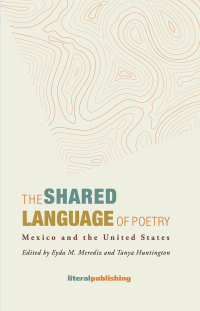Eyda M. Merediz

Associate Director for Graduate Academic Affairs and Strategic Initiatives, School of Languages, Literatures, and Cultures
Associate Professor, Spanish and Portuguese
Affiliate Faculty, Latin American and Caribbean Studies Center
emerediz@umd.edu
2215H Jiménez Hall
Get Directions
Eyda M. Merediz arrived at the University of Maryland after finishing her doctoral degree at Princeton University and teaching at Union and Smith Colleges. Her academic interests concentrate primarily on the fields of Colonial Latin American Studies and Early Modern Transatlantic Literatures and Cultures. In addition to several articles and a critical edition, she has published a monograph, Refracted Images: The Canary Islands through a New World Lens (MRTS 2004) that uses the important colonial outpost of the Canary Islands to explore the fluidity of literary and cultural exchanges that prevailed in the Hispanic World of the sixteenth and seventeenth centuries. An updated edition of this work in Spanish will soon appear as part of the Pensamiento TEA series under the auspices of the Tenerife Espacio de las Artes. She has also edited, with Santa Arias, the volume Approaches to Teaching the Writings of Bartolomé de las Casas (MLA 2008). She has also taught and researched on more contemporary Caribbean Studies, in specific Cuban cinema and literature and its trans-national dimension as shown in her edited volume, with Nina Gerassi-Navarro, Otros estudios transatlánticos: lecturas desde lo latinoamericano (IILI, 2009). More recently, she has undertaken a project centered on the writings of Bartolomé de las Casas and the appropriation of his legacy in the Caribbean.
Merediz has served as SLLC Associate Director for Graduate Affairs and Strategic Initiatives (2023-2026), SPAP Department Head (2015-2021), SPAP Director of Graduate Studies and Director of the Honors Program, as well as the Undergraduate Advisor for the Certificate on Latin American Studies. She has enriched curricular offerings at all levels in her areas of specialization, especially designing courses on Latin American Popular Culture mixing visual (Telenovelas) and literary materials. For the Office of International Programs, Merediz have designed several Study Abroad programs and courses for the winter term in Cuba (2002-03), Seville-Spain (2005-present), and Quito/Cuenca-Ecuador (2009-present), for the summer in Salamanca/Barcelona-Spain (2002-present), and also for the semester program in Seville-Spain (2012-present).
Publications
The Shared Language of Poetry: Mexico and the United States
The Shared Language of Poetry: Mexico and the United States began as a symposium funded in great part by the NEH and has now become an anthology of essays and poetry that makes a passionate case for the essential value of the humanities.
Author/Lead: Eyda M. MeredizNon-ARHU Contributor(s): Tanya Huntington

The assemblage of different languages—Spanish, English and Indigenous, as well as in-between inflections—shows the complexity of linguistic and cultural connections between and within the two nations. The University of Maryland, College Park, along with Georgetown University, the Mexican Cultural Institute, and the Library of Congress came together to organize the original symposium, held in November 2021 in Washington, D.C. and College Park, Maryland. As co- organizers Eyda M. Merediz and Gwen Kirkpatrick put it in the introduction to this volume, “To work in poetry is to navigate manifold meanings, unanticipated relationships between joy and sorrow, play and lamentation, the everyday and the sacred, high and low, the oral and the written.”
Here, fourteen scholars and poets from Mexico and the United States attest to the power of contemporary poetry through essays on topics ranging from “Poetic Breadth in the 21st Century” to “Translation in a Global World,” from “Representing and Defying Affect through the Body Poetic” to the “Linguistic and Geographic Remappings of Indigenous Poetics.” These invigorating texts are complemented by an anthology of verse published in the original languages, as well as in English or Spanish translation. The volume’s intellectual and linguistic diversity offers a vibrant picture of the power of poetry today and for all time.
Read More about The Shared Language of Poetry: Mexico and the United States
De islas, archipiélagos y periplos letrados: de vuelta a Colón en el siglo XIX/Of Islands, Archipelagos, and Intellectual Wanderings: Columbus in the 19th Century Once Again
Palabras clave: estudios culturales transatlánticos, Cuba, Islas Canarias, poesía, Cristóbal Colón, colonialidad, estudios coloniales caribeños
Author/Lead: Eyda M. MeredizCon un acercamiento transatlántico y relacional, este artículo reconsidera una producción poética del siglo XIX en torno a la figura romantizada de Cristóbal Colón en el Caribe hispano y en las Islas Canarias. La producción poética se lee como parte del meta-archipiélago formulado por Antonio Benítez Rojo, que parte de figuras fundacionales como Bartolomé de las Casas. El objetivo es reconsiderar las negociaciones de la condición colonial en tiempos decoloniales.
The Caribbean conundrum. José Antonio Saco’s Hispanic archive and the Black Atlantic
This essay revisits José Antonio Saco’s intellectual contribution to the Hispanic archive that emerges from the recovery of Bartolomé de las Casas’ texts and the colonial connections between indigenous slavery and the African slave trade.
Author/Lead: Eyda M. MeredizThis essay revisits José Antonio Saco’s intellectual contribution to the Hispanic archive that emerges from the recovery of Bartolomé de las Casas’ texts and the colonial connections between indigenous slavery and the African slave trade. Saco adheres to a notion of Hispanism, filtered through Las Casas, that facilitates a multiple and contradictory identification with coloniality, that allows him to anchor, his national, Caribbean, and universal historiographical project in the Hispanic and Black Atlantic. In turn, Saco and the Lascasian legacy that he rescued becomes an important colonial departure for contemporary theorizations: Antonio Benítez Rojo’s Caribbean readings of a paradoxical and complex repeating island, as well as Fernando Ortiz’ vision of a process of transculturation with repercussions beyond the Caribbean.
Geografía vs. Geopolítica: las Islas Canarias, América, África
The proximity of the Canary Islands to Africa determined in many ways how identity politics in the early modern period played out in a historiography that had to joggle geography, geopolitics and coloniality.
Author/Lead: Eyda M. MeredizEstudios coloniales latinoamericanos en el siglo XXI: Nuevos itinerarios. Ed. Stephanie Kirk. Pittsburgh: IILI.
Malinches canarias: hacia un mestizaje light
This article reviews historical and literary narratives about mestizaje in the Canary Islands in the early modern period.
Author/Lead: Eyda M. MeredizModernidad, colonialidad y escritura en América Latina. Ed. María Jesús Benítez. Comp. Valeria Añón y Loreley El Jaber. Tucumán, Argentina: Editorial de la Universidad Nacional de Tucumán (EDUNT).
Read More about Malinches canarias: hacia un mestizaje light

